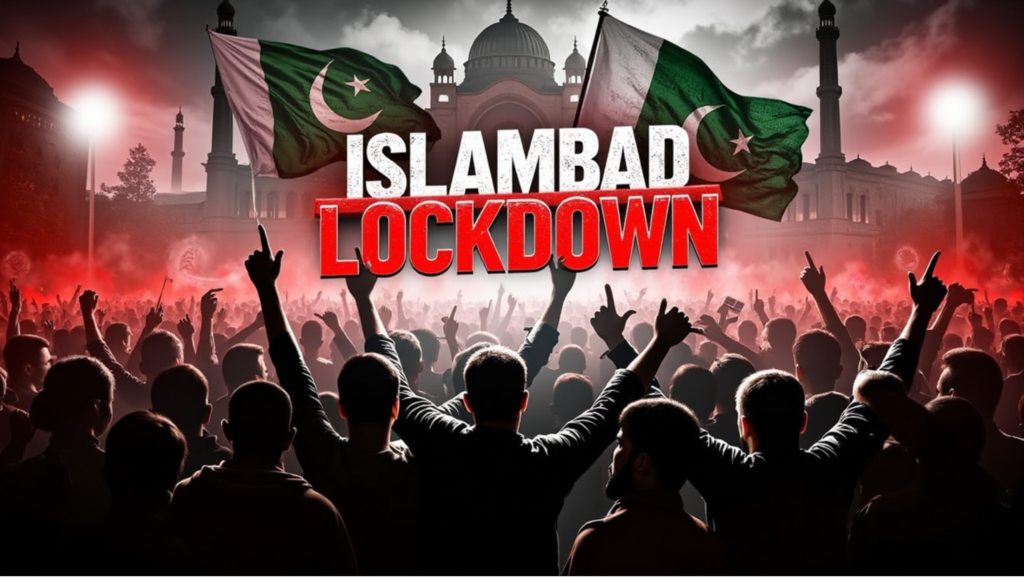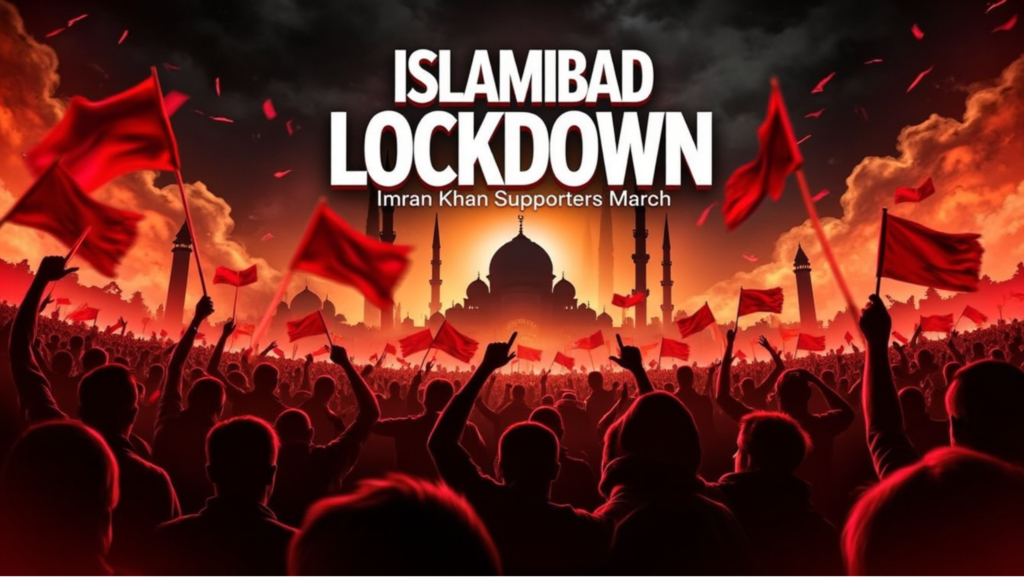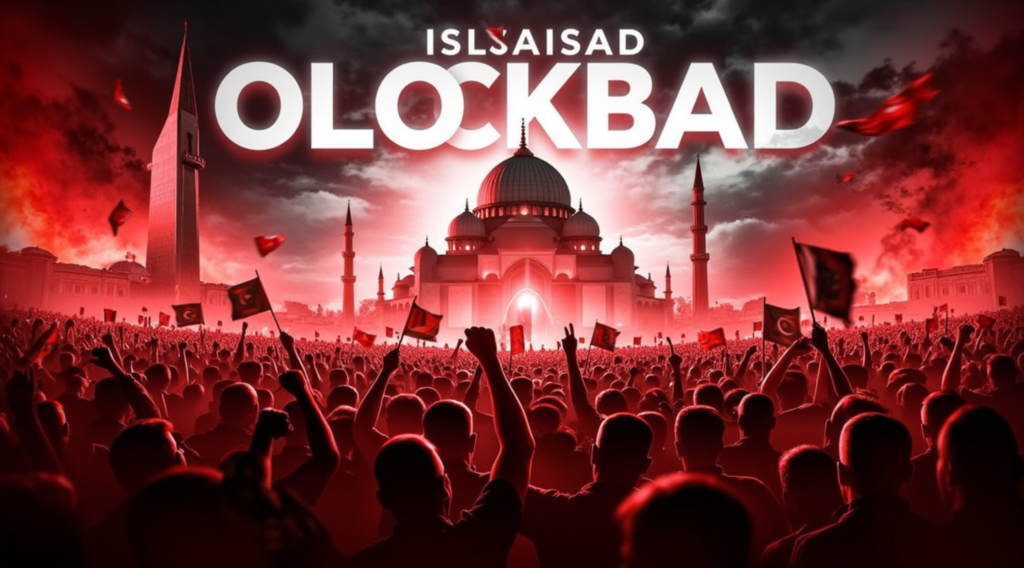Introduction
Islamabad, the capital of Pakistan, is presently in the hold of a remarkable lockdown as allies of previous State head Imran Khan plan for a monstrous walk. Roads are blockaded, public vehicle is limited, and security work force are positioned across the city to keep everything under control.
The walk, coordinated by Khan’s party, Pakistan Tehreek-e-Insaf (PTI), has attracted inescapable consideration because of its capability to upset predictability and impact Pakistan’s political direction.
What has prompted such a critical demonstration of power in the capital? Furthermore, how might this walk affect the country’s delicate majority rules government? How about we plunge into the subtleties.
Foundation of the Walk
The walk comes from profound political turmoil in Pakistan following Imran Khan’s expulsion from office through a parliamentary no-certainty vote. Khan charges this was important for an unfamiliar scheme and has since mobilized his allies, requesting new races.
This specific walk is a finish of long stretches of preparation endeavors by PTI, pointed toward testing the decision government and restoring Khan’s initiative. Nonconformists are calling for constituent changes and responsibility, underscoring their disappointment with the ongoing organization.
Government’s Reaction
To counter the approaching dissent, the public authority has carried out rigid safety efforts across Islamabad. Significant streets prompting the city have been fixed with steel trailers and razor wire. Moreover, a great many police and paramilitary powers have been sent to forestall any break of safety.
The public authority has legitimized these actions as important to guarantee public security, refering to the gamble of viciousness during such enormous scope social affairs. In any case, pundits contend that the lockdown encroaches on residents’ freedoms and mirrors the state’s powerlessness to deal with disagree.
Influence on the City
The lockdown has gotten life Islamabad to a halt. Workplaces stay shut, schools are suspended, and gridlocks are a typical sight because of street terminations. Suburbanites are confronting colossal challenges, while occupants close to the dissent regions dread likely conflicts among demonstrators and policing.
The city’s organizations are additionally feeling the squeeze, with many compelled to briefly close down tasks. For day to day breadwinners, the end in action presents huge monetary difficulties, featuring the expansive outcomes of political agitation.
Job of Imran Khan in Assembling Allies
Imran Khan’s capacity to excite public help stays unrivaled. A magnetic pioneer, he has reliably situated himself as a crusader against defilement and a boss of the everyday person. Through red hot discourses and online entertainment crusades, Khan has mobilized large number of followers to join the walk, displaying his persevering through fame.

This isn’t whenever Khan first has driven such showings. His 2014 demonstration fight, requesting the renunciation of the then State head Nawaz Sharif, fills in as a diagram for his ongoing procedure. The ongoing walk, be that as it may, conveys significantly higher stakes.
Requests of the Dissenters
The essential interest of the marchers is to break down the ongoing government and declare prompt general decisions. Nonconformists accept that the decision alliance needs authenticity and neglects to address squeezing financial and social difficulties. Different complaints incorporate expansion, joblessness, and saw impedance by outer powers in Pakistan’s homegrown undertakings.
Khan’s allies additionally request an autonomous examination concerning the supposed scheme behind his expelling, contending that the country’s power is in danger. These requests resound firmly with a critical part of Pakistan’s populace, intensifying the walk’s force.
Security Difficulties During the Lockdown
Guaranteeing security during huge scope political social affairs is no simple assignment, and the Islamabad lockdown highlights this test. With huge number of dissenters expected to unite in the capital, policing the troublesome assignment of keeping up with harmony while regarding residents’ privileges. The gamble of conflicts among dissidents and security powers is ever-present, particularly given past episodes where comparable showings turned rough.
To forestall acceleration, specialists have sent revolt control units, water cannons, and poisonous gas in key regions. In any case, the sheer number of individuals included presents strategic difficulties. Also, there are worries about the expected presence of lowlifes who could take advantage of the circumstance to prompt mayhem, further convoluting the public authority’s reaction.
Financial Outcomes
The lockdown has had prompt and noticeable financial repercussions. Islamabad’s clamoring markets and business center points are shockingly calm as brokers dread disturbances. Day to day breadwinners, including road merchants and workers, are among the hardest hit, as their pay relies upon the city’s everyday tasks.
Moreover, the walk’s political vulnerability has included pressure Pakistan’s now striving economy. The securities exchange has given indications of insecurity, and financial backer certainty stays temperamental because of fears of delayed agitation. Such financial aftermath features the more extensive expenses of political precariousness, for Islamabad as well as for the country all in all.
Public and Political Responses
Conclusions about the lockdown and the walk are profoundly isolated. Numerous residents, particularly those straightforwardly impacted by street terminations and disturbances, express dissatisfaction with both the public authority and dissidents. As far as they might be concerned, political strategic maneuvers are eclipsing the requirements of standard individuals, who are passed on to manage the aftermath.
Then again, PTI allies view the walk as a basic move toward recovering majority rule respectability. Resistance groups, while frequently disparaging of the public authority, have taken blended positions — some blame the public authority for going overboard, while others question the thought processes behind PTI’s activities. This polarization mirrors the exceptionally charged political environment in Pakistan.
Media Inclusion and Stories
The media’s depiction of the Islamabad lockdown and Imran Khan’s walk differs broadly. Nearby outlets frequently reflect sectarian predispositions, either supporting the public authority’s activities or enhancing the dissidents’ complaints. Worldwide media, notwithstanding, will in general zero in on the more extensive ramifications for Pakistan’s vote based system and steadiness.
Web-based entertainment has likewise assumed an essential part in forming popular assessment. Stages like Twitter and Facebook are overwhelmed with hashtags, recordings, and live updates, with PTI allies utilizing these channels to stir cooperation. In any case, deception and phony news are widespread, confusing endeavors to survey the ground reality.
Lawful Ramifications
Huge scope fights and lockdowns frequently ride the scarce difference between lawful privileges and public wellbeing. While tranquil gathering is a protected right in Pakistan, the public authority contends that remarkable measures are important to forestall disarray. This has started banters about the lawfulness of detours, confinements, and limitations on development.
Lawful specialists are partitioned on whether the public authority’s activities disregard established assurances. In the mean time, reports of captures and crackdowns on dissidents raise worries about potential basic freedoms infringement. These lawful and moral inquiries add one more layer of intricacy to a generally unstable circumstance.
Correlations with Past Political Developments
Political walks have for quite some time been a piece of Pakistan’s vote based texture, and Imran Khan’s ongoing procedure draws matches with past developments. His own 2014 demonstration against supposed political decision fixing stays perhaps of the main dissent in late history. Also, the 2007 legal counselors’ development for legal freedom fills in to act as an illustration of how coordinated public contradiction can achieve change.
Notwithstanding, the ongoing walk varies in its scale and setting. Not at all like past shows, this dissent happens in the midst of a monetary emergency and elevated political polarization, having its potential effect considerably more critical.
Possible Results of the Walk
As the circumstance unfurls, a few situations could arise. In the event that the public authority surrenders to dissidents’ requests, it could prepare for early races, conceding PTI an opportunity to recover power. On the other hand, a drawn out stalemate could prompt further turmoil, extending political and monetary precariousness.
There is likewise the chance of an arranged settlement, where the two sides settle on constituent changes or a guide for tending to complaints. Anything the result, this walk will probably leave an enduring engraving on Pakistan’s political scene.
Eventual fate of Political Exhibits in Pakistan
The Islamabad lockdown and PTI walk feature the developing pattern of public fights as a device for political articulation in Pakistan. While such exhibitions can fortify majority rule government by considering pioneers responsible, they additionally risk making gridlock and shakiness when abused.
Pushing ahead, the nation needs to figure out some kind of harmony between regarding the option to dissent and keeping everything under control. Straightforward administration and exchange between political partners could diminish the requirement for such high-stakes conflicts, encouraging a more steady world of politics.
Conclusion
The Islamabad lockdown in front of Imran Khan’s ally walk is a vital turning point in Pakistan’s political history. It reflects the profound divisions inside the country as well as the versatility of its popularity based processes. Whether this walk prompts significant change or further strife is not yet clear, yet its effect on Pakistan’s future is certain.
FAQs
- For what reason is Islamabad on lockdown?
Islamabad is on lockdown because of an arranged walk by allies of Imran Khan, pointed toward requesting early races and challenging the ongoing government. - What are the nonconformists requesting?
The dissidents, drove by Imran Khan, are requesting electing changes, responsibility, and prompt general races. - What measures has the public authority taken?
The public authority has conveyed security powers, fixed significant streets with blockades, and limited public development to forestall turmoil during the walk. - How does this fight influence standard residents?
The lockdown has disturbed day to day existence, influencing transportation, organizations, and admittance to fundamental administrations. - What may be the drawn out ramifications of this walk?
The walk could prompt political changes, early decisions, or delayed agitation, affecting Pakistan’s vote based and monetary solidness.





Pingback: Drake Slams UMG & Spotify for Inflating Kendrick's Hit